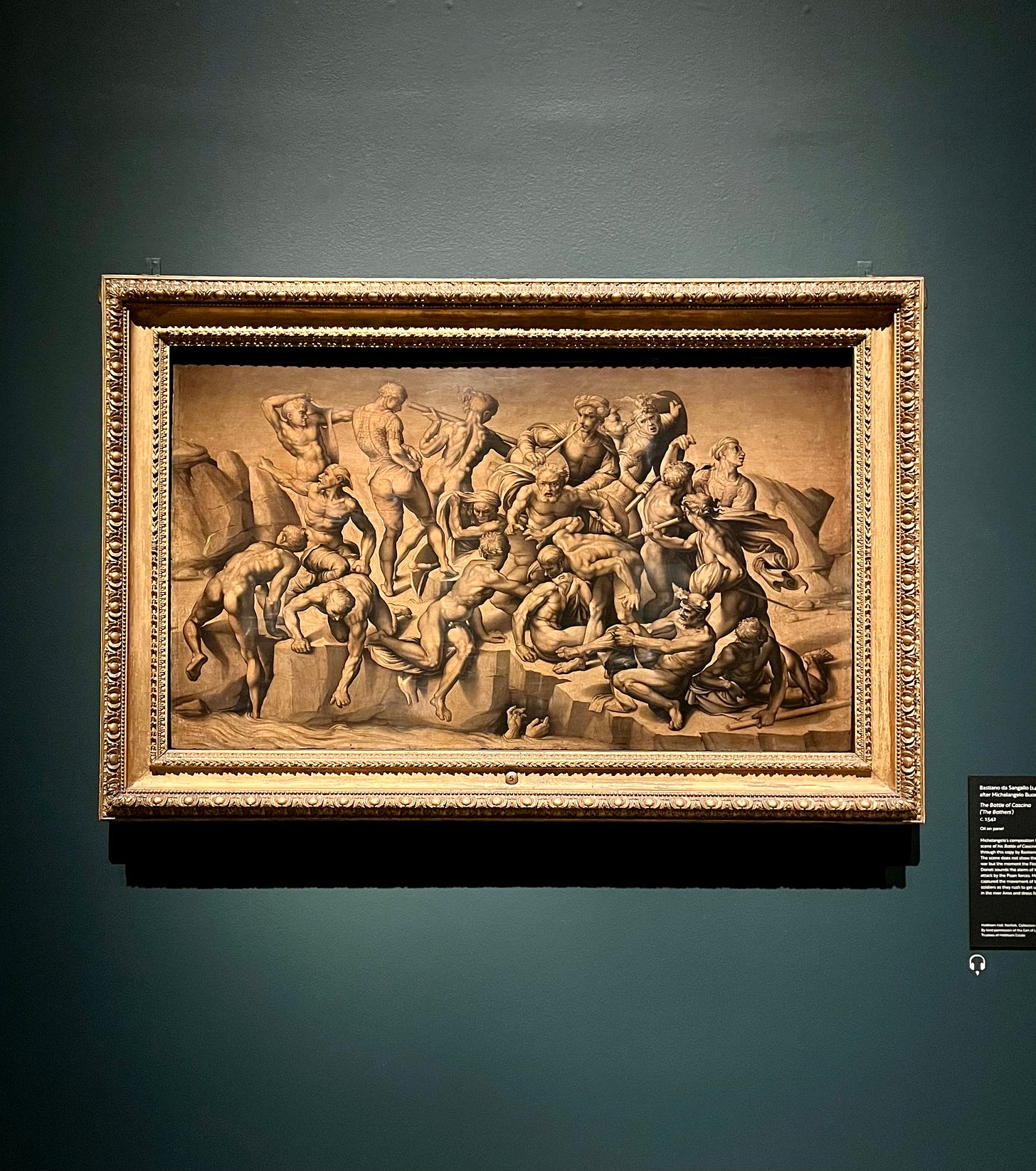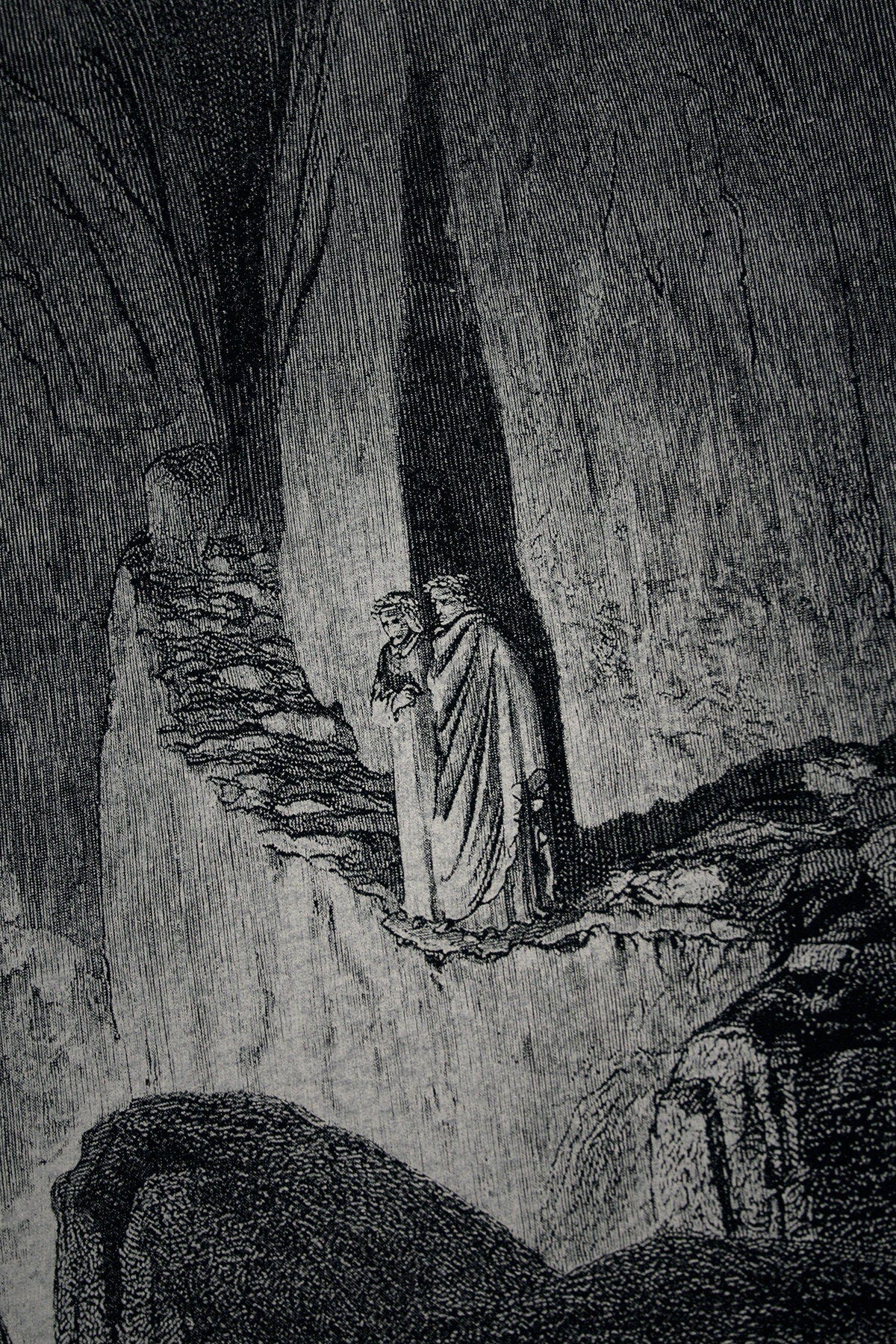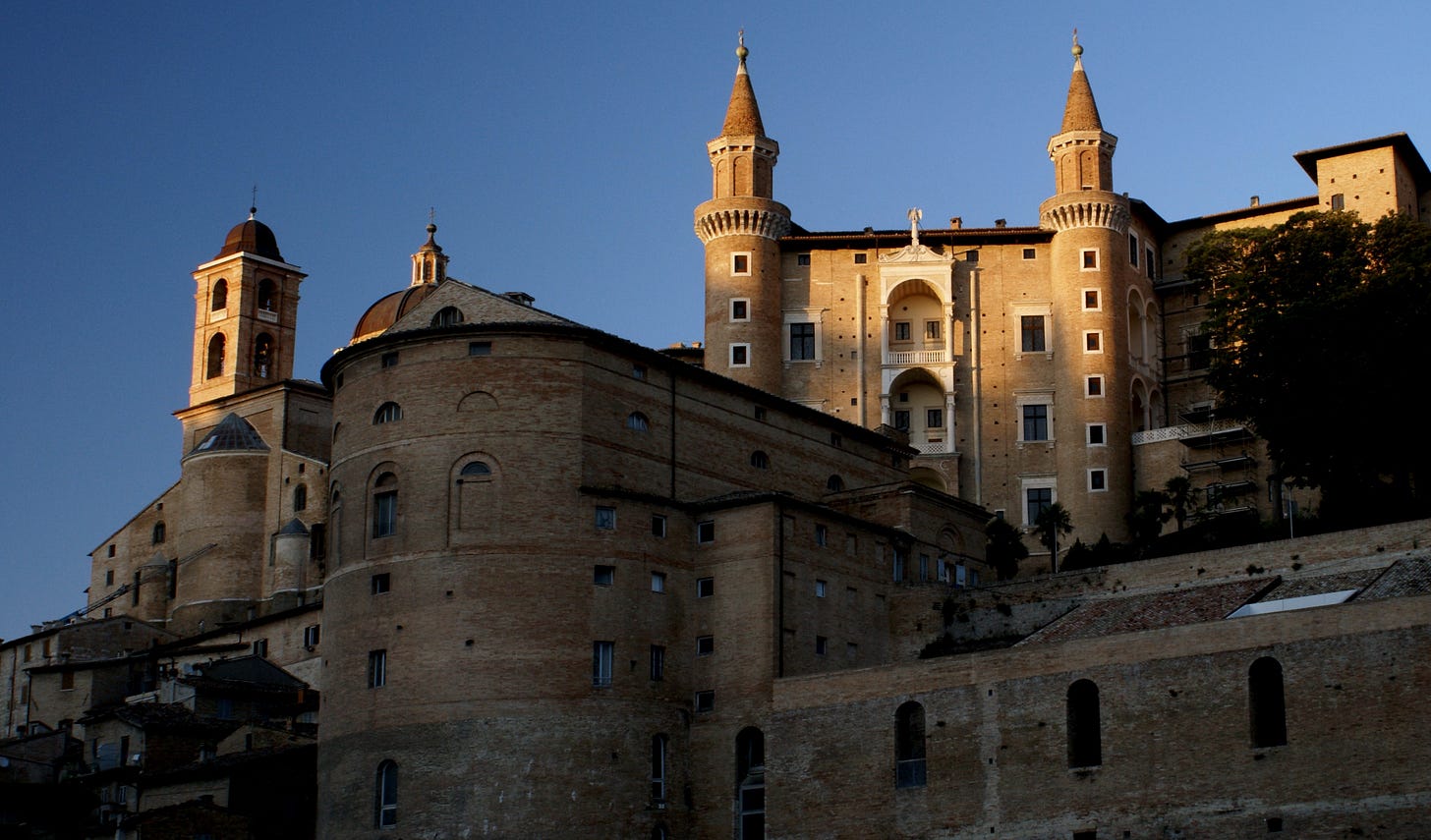Dante & Machiavelli: The Harmony Between the Spirit and Intellect
(Inferno, Canto XXVII): Guido da Montefeltro, Machiavelli and Evil Counsellors
Never attempt to win by force what can be won by deception.
~ from Machiavelli’s Prince
Welcome to Dante Read-Along! 🌒
(If this post appears truncated in your inbox you can read it on the web by clicking here. )
Welcome to Dante Book Club, where you and I descend into Hell and Purgatory to be able to ascend to Paradise. Our guide is the great Roman poet Virgil and in this Twenty-Seventh Canto we look again into the eighth bolgia of the Eighth Circle and encounter Guido da Montefeltro. You can find the main page of the read-along right here, reading schedule here, the list of characters here (coming soon), and the list of chat threads here.
In each post you can find a brief summary of the canto, philosophical exercises that you can draw from it, themes, character, and symbolism explanations.
All the wonderful illustrations are done specially for the Dante Read-Along by the one and only Luana Montebello.
This Week’s Circle ⭕️
Eighth Circle, eighth bolgia, continued - Deceivers and Counselors of Fraud - Dante and Virgil meet another soul in a flame - Guido da Montafeltro and Boniface VIII - Absolution and Repentance.
Canto XXVII Summary:
After sharing his story with Dante and Virgil, Ulysses, encased in flame, is still. As he moves away, another soul comes forward in this eighth bolgia of deceit, the tip of its flame producing a cacophony of sound that captured their attention. Dante refers to a legend far back in time to bring this sound to life:
Even as the Sicilian bull (that first
had bellowed with the cry—and this was just—
of him who shaped it with his instruments)
would always bellow with its victim’s voice,
so that, although that bull was only brass,
it seemed as if it were pierced through by pain;
so were the helpless words that, from the first,
had found no path or exit from the flame,
transformed into the language of the fire.
XXVII.7-15
The stories behind these references are a treasure in themselves. Dante tells of the Sicilian tyrant Phalaris (6th c. BC), well known for his inordinate cruelty, and the Athenian craftsman Perillus. The artisan created a bronze bull, into which victims sentenced to death were placed. When it was heated in the flames, the tortured souls inside would cry out, and the false bull would sound with terrible bellowing. Perillus was the first to suffer the punishment for his role in creating such a device. Ovid mentions the event in his Ars Amatoria:
So Phalaris the brute Perillus bade
roast in the bull the wretch himself had made.
each earned his fate; nought fairer than to trice
the death-deviser in his own device.
Ovid Ars Amatoria I.656-659
Just as the voices streaming from the bull had no way to escape clearly and came out muffled and indistinct, so did the voice coming to them from the flame. The soul recognized Virgil’s dialect from his conversation with Ulysses and asked them to speak with him. Thinking that they were newly arrived sinners, the soul asked of Italy and of the politics of Romagna, his home. While he remains unnamed in the Canto, this soul is Guido da Montefeltro, a famous Ghibelline captain.
Dante was ready, even eager to speak, and gives a speech in lines 36-57 outlining the state of the various cities in Romagna.
He declares that Ravenna and Cervia are under the protection of the Polenta family, whose shield is of an eagle, and who protect it wisely. Forlia is the town that “stood long trial” through the very direction and guidance of Guido himself; though Dante does not yet know this is who he is speaking to. It is now, Dante says, “beneath green paws” of the family Ordelaffi, signified by the lion on their coat of arms.
The mastiffs of Verucchio were the father Malatesta da Verrucchio and his son Malatestino. The other two brothers, Gianciotto and Paolo, were the husband and lover of Francesca da Rimini from Canto V. This father and son - harsh governors - had defeated Montagna, a Ghibelline, and had him killed. The “cities by Lamone and Santerno (49) are Faenza and Imola, and the Lion of the White Lair (again, a reference to the coat of arms) is Maghinardo of the Pagani family, whose loyalties reached between both the Guelfs and the Ghibellines.
The last thing Dante has to report is of the city of Cecena, next to the river Savio, which was not under a tyrant, but neither could it rule itself. This concludes his overview of the region that Guido has asked about and a glimpse into the affairs of the political landscape.
Dante then asks for information about the shade, since he has offered what he knew of the world above. The shade prepares to speak:
After the flame, in customary fashion,
had roared awhile, it moved its pointed tip
this side and that and then set free this breath:
XXVII.58-60
The shade believes still that Dante had come to this bolgia as his punishment, and even declares that he would not share details about himself if he knew it could be known above.
Generally speaking, the shades in the Circles of Fraud, unlike those in the circles above, do not want to have their stories made known in the world.1
Guido begins to tell his story. After his time successfully leading men in battle, he exchanged the sword for the cord, he became a Franciscan friar. This story could be an invention of Dante’s, for the only other reference to it comes after the writing of the Divine Comedy, and it is not known if that writer used Dante as his source. The chronicler Riccobaldo wrote of Guido:
At that time there was a Franciscan named Guido, a former count of Montefeltro, who was a general of the Ghibellines. Pope Boniface called him in and urged him to become leader in the war against the rebellious cardinals. And when he persisted in refusing to have any part in it, the pope said, “At least you can advise me how to get the better of them.2
Guido curses that High Priest, the pope, for misleading him into sin, and wants to explain to Dante how and why it came about. The sins of the lion and the fox are those of force and fraud, and the sins of the lion would have placed him in the seventh circle of violence rather than in the eighth circle of fraud.
There are two ways or methods whereby one man may injure or oppress another; the one is fraud and subtlety, the other open force and violence; the former of which is esteemed the part of a fox, and the latter of a lion; both of them certainly very unworthy of a reasonable creature, though fraud, I think, is the more odious of the two.3
Guido knew fraud all too well; but on becoming a friar, he repented and laments that he would have then been free of these sins if not for the influence of one who brought him there: Pope Boniface VIII, the “prince of the new Pharisees” (85). Boniface was so corrupt that he:
Took no care for the highest office or
the holy orders that were his, or for
my cord, which used to make its wearers leaner.
XXVII.91-93
Boniface sought out Guido as the Emperor Constantine had once sought the saint Silvester.
This event was Constantine's conversion as well as the basis for which the fraudulent Donation of Constantine was based. Silvester - who was pope from 314-345, after these events - was in hiding due to Constantine’s persecution of the Christians. Constantine had a dream in which saints Peter and Paul spoke to him:
Summon Silvester the bishop, who is in hiding on Mount Sirapte. He will show you a pool into which you will immerse yourself three times and so be fully cured of the disease of leprosy…When the emperor went down into the water of baptism, a marvelous, brilliant light shone around him: he emerged from the pool clean of his leprosy.4
Boniface’s request was so absurd that Guido thought he must be drunk, or delirious. The pope declared:
‘Your heart must not mistrust:
I now absolve you in advance-teach me
to batter Penestrino to the ground.
XXVII.100-102
The pope is declaring that he will pardon him for his sins in advance because of the great power he holds; with the advice that Guido will give him, Boniface will see that Penestrino is ruined.
Guido thought that to disobey the pope while he was a friar was a worse crime than false council, and only agreed since Boniface promised to absolve him ahead of time; but pre-absolution for a premeditated crime is not how repentance worked. Because of this promise, Guido never repented for this crime, thinking he was already forgiven.
Upon his death, Guido continues, both St. Francis, the founder of his Franciscan order, and a black cherubim, one who had fallen from the highest levels of heaven into hell in the rebellion against God, both came to claim his soul. Without repentance on his part, Guido was doomed to hell.
One can’t absolve a man who’s not repented,
and no one can repent and will at once;
the law of contradiction won’t allow it.
XXVII.118-120
The judge Minos, who we saw in Inferno V.4-15, judged Guido by that wrapping of his tail, and he was cast here into the eighth bolgia. Dante and Virgil watched Guido leave as he finished his tale, his flame flickering in pain.
They moved along then, and walked over the next bridge where the ninth bolgia came into view: the sowers of discord.
💭 Philosophical Exercises:
“…he who seeks to deceive will always find someone who will allow himself to be deceived.”
~ Machiavelli
I truly believe that Italy is a gift bestowed upon us mortals by the immortals. It feels as if God—or the Gods, if you prefer the language of classical antiquity—are telling us:
“Here is my proof to you, whose lives are brief and bounded. Look upon this land. Without my inspiration, without my Muse breathing life into it, how could so many divinely inspired masterpieces be born in such a small corner of the world?”
In June 2011, my parents and I were driving back to the little town where we were staying, after a short visit to Florence. At some point, we felt the need to take a break, grab a coffee, and have a bite to eat, so we stopped in a town called Urbino.
We knew nothing about Urbino, and how ashamed we felt of our ignorance when we discovered just how culturally, historically, and intellectually rich this town is. By some stroke of luck, we parked our car right in front of the Ducal Palace, built by none other than Duke Federico da Montefeltro himself. Yes, you heard that name correctly — the very same Montefeltro that Dante and Virgil encounter just after their conversation with Ulysses.
Federico was a descendant of Guido, whom Dante placed in the Inferno. Though two centuries separated them, as the saying goes, the roots of genius often run through the bloodline. Like his predecessor Guido, Federico was an extraordinarily intelligent man — a true Renaissance figure. My family and I were astonished to discover that in this small town stood such a grand palace, housing masterpieces by early Renaissance geniuses such as Paolo Uccello, Piero della Francesca, and even Titian. If you’re curious to learn more about this remarkable man — whose ancestor found a place among the damned in Dante’s Inferno — I highly recommend Jane Stevenson’s biography The Light of Italy.
It is hard to know what Federico thought of Guido’s literary fate. If Federico was — and still is — called The Light of Italy, Guido, by contrast, was known as the fox for his astutia, his cunning mind.5
Nobody can save you but you.
The language that Guido speaks in this canto is as emotionally stirring and I would dare say inspiring as that of Ulysses:
But when I saw myself come to that part
of life when it is fitting for all men
to lower sails and gather in their ropes,what once had been my joy was now dejection;
repenting and confessing, I became
a friar; and — poor me — it would have helped.
The nautical references in his speech run parallel to the imagery that dominated the previous canto. Guido like Ulysses had a chance to be saved but was betrayed by his own guile.
In some sense, there are parallels between Dante’s and Guido’s spiritual journeys as well. Dante was also a soldier, and participated in the Battle of Campaldino, while Guido, as we’ve mentioned many times was a military strategist.
If Dante’s spiritual journey could be described as a passage from bad to good (Inferno → Purgatorio → Paradiso), for Guido the path unfolded from bad to good and then back to bad again: from military strategist, to Franciscan friar, to betraying his spiritual salvation by aiding Boniface — and, ultimately, to damnation.
When Your Reason Betrays You.
In a healthy person - according to the Ancient philosophers and Christian theologians6 - mind and spirit must be in harmony. Dante’s journey is precisely this: the striving to sharpen his moral discernment and fortify his will, so that he remains steadfast and untempted to stray from the righteous path, even when seduced to do so.
Guido had his Beatrice (St. Francis) to guide his spirit but had no Virgil to guide his mind. When Boniface came to him with an intriguing offer, Guido’s cunning and intelligent mind calculated like a military strategist. What makes the pact with the devil so alluring is that it presents itself as the voice of reason.
Reason, when divorced from virtue, becomes the instrument of a criminal mind.
This, of course, cannot help but remind us of a Faustian pact, where Mephistopheles (the devil) proposes a tempting deal to the scholar called Faust. Mephistopheles promises infinite powers on Earth in exchange for Faust’s soul.
Dante came under some attack by certain religious commentators for presenting St. Francis almost as foolish in these lines:
Then Francis came, as soon as I was dead,
for me; but one of the black cherubim
told him: ‘Don’t bear him off; do not cheat me.He must come down among my menials;
the counsel that he gave was fraudulent;
since then, I’ve kept close track, to snatch his scalp;one can’t absolve a man who’s not repented,
and no one can repent and will at once;
the law of contradiction won’t allow it.’(lines 112-120)
They wonder how Saint Francis could descend to save a soul already destined for damnation by divine decree. What a waste of the Saint’s time!
It seems to me, in my humble opinion, that it is clear: our soul (or spirit, or, in more secular terms, our conscience) may attempt to journey toward the good, but it is bound to fail if our mind and reason are corrupt. We are made of both reason and emotion, the rational and the irrational, logic and belief — these two sides must remain in balance, or one will inevitably overpower the other.
Thus, when Saint Francis departs and Guido is left alone with the black cherub, the latter says to him:
he took hold of me and said: ‘Perhaps
you did not think that I was a logician!’He carried me to Minos; and that monster
twisted his tail eight times around his hide
and then, when he had bit it in great anger,announced: ‘This one is for the thieving fire’;
for which — and where, you see — I now am lost,
and in this garb I move in bitterness.”(lines 122-129)
Final thoughts
“Perhaps you did not think that I was a logician!” — what a powerful way to announce to the damned soul the very reason for his fall. It struck me deeply how both Ulysses and Guido come so close to salvation, so near to the good, and yet remain so far away because of their intelligence. Their rationality paradoxically leads them into irrationality. How foolish it was of Guido to believe that, by giving such wicked counsel, he could somehow secure his place in Heaven!
In his essay on Machiavelli, the historian of ideas Isaiah Berlin explains that the revolutionary aspect of The Prince was not the novelty of Machiavelli’s ideas, but rather his legitimisation of the notion that the ends justify the means. Before Machiavelli, it was considered dishonourable to claim that any method could be acceptable as long as it led to victory. What Machiavelli did was to strip strategy away from virtue, separating them into two distinct realms.
As for the philosophical exercise I try to practice in my own life — I aim to keep my gaze steady on the goal I have set for myself, and to always remember that my mind will attempt to deceive me, to convince me there are countless ways to avoid hard work.
Once again, we are reminded - as we were by the great Aeneas - that how we do things is just as important as what we do
This Week’s Sinners and Virtuous 🎭
(Themes, Quotes, Terms and Characters)
True repentance
Guido speaks of his contrition, confession, and satisfaction as though they were the nearest of conveniences to attain an end. Do we believe, on the strength, of his account, that he had actually fooled God?
~ Hollander’s commentary on The Inferno
Needless to say, Guido — like all the other sinners in the Inferno — does not repent; he shifts the blame for his fall onto others. Once again, there is nothing dogmatic in Dante: his virtue is upheld by reason. The reason why the souls in Inferno can never escape is because, to do so, one must first look inward, into the depths of one’s own mind.
Fame and Infamy
If I thought my reply were meant for one
who ever could return into the world,
this flame would stir no more; and yet, since none —if what I hear is true — ever returned
alive from this abyss, then without fear
of facing infamy, I answer you.(lines 61-66)
As we draw nearer to the threshold of Purgatory, it is worth noting how the disposition of souls toward the traveller begins to alter.
In the Inferno, the damned crave remembrance as a balm for their torment; they speak, yes, but never without protest, never without the reflex to cast the weight of their fall upon another’s shoulders.
Guido, with the quiet bitterness of the irredeemable, lays the burden of his disgrace at the feet of Boniface, as if one could transfer the weight of one’s own soul to the back of another.
The Sicilian Bull: The Conversion from High to Low
Even as the Sicilian bull (that first
had bellowed with the cry — and this was just —
of him who shaped it with his instruments)would always bellow with its victim’s voice,
so that, although that bull was only brass,
it seemed as if it were pierced through by pain;
This is the bronze bull, the cruel invention of the tyrant Phalaris of Sicily, where victims were burned alive inside the metal beast. As they cried out in pain, the design of the bull twisted their human screams into the sound of bellowing, like an animal, just to entertain the tyrant. In the same way, the soul trapped in the flame in this canto tries to speak, but his words are trapped and distorted, as if swallowed by fire (Inferno, Canto 27, lines 7–15). There’s an extra layer of bitter irony here: the bull’s creator, Perillos of Athens, ended up suffering inside his own invention, consumed by the very cruelty he imagined.
Ulysses and Guido burn in the flame of their own intelligence and guile.
Quotes 🖋️
(The ones I keep in my journal as reminders of eternal wisdom):
You surely know that I possess the power
to lock and unlock Heaven; for the keys
my predecessor did not prize are two.’Then his grave arguments compelled me so,
my silence seemed a worse offense than speech,
and I said: ‘Since you cleanse me of the sinthat I must now fall into, Father, know:
long promises and very brief fulfillments
will bring a victory to your high throne.’
Sayers Hell 245
Singleton, Commentary on Inferno 485
Cicero de Officiis I.xiii.41
Jacobus de Voragine, Legenda Aurea, Vol. I p 64-65
Hollander, Inferno, 508
… who, it is worth mentioning, based their reasoning on the ideas by the ancient philosophers. Nothing comes out of nothing.



















This is very sad. Thank you Vashik.